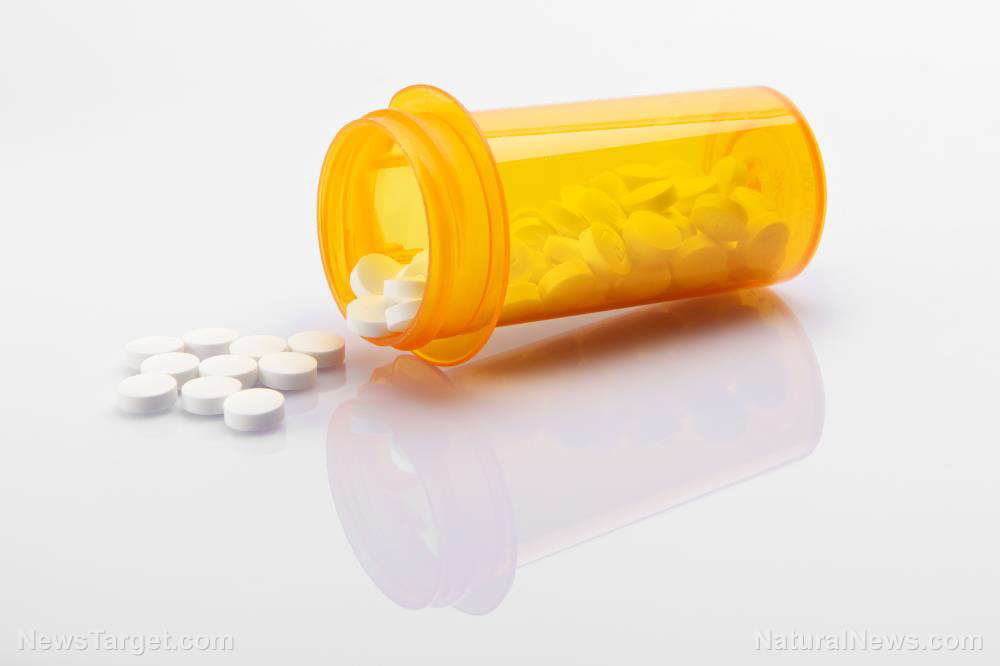How everyday meds may be damaging your gut – and what you can do about it
09/09/2025 / By Olivia Cook

- Antibiotics are not the only threat. About one in four nonantibiotic drugs, including acid blockers, allergy meds, antidepressants and statins, may disrupt gut health.
- Gut damage can be long-lasting. Dysbiosis caused by medications can persist for months and increase your risk of chronic conditions.
- Recovery is possible. Diverse plant-based diets, fermented foods, prebiotics and probiotics support microbiome healing and restore microbiome balance.
- Vulnerable groups face greater risk. Older adults with chronic illness and frequent medication users are more likely to experience lasting gut microbiome disruption.
- Your microbiome matters. From immune strength to mental health, your gut has wide-reaching effects and benefits to your overall well-being – and deserves care.
If you’ve ever taken antibiotics for strep throat or reached for an antacid to calm heartburn, you’ve probably felt relief. But what if those same medications – and even ones not intended to treat infections – were quietly reshaping your gut in ways that could impact your digestion, immunity and long-term health?
That’s the warning coming from recent research and it’s one that everyday people – not just doctors and scientists – need to hear.
According to a 2025 study published in Nature, covered by YourNEWS and the Epoch Times, nearly one in four commonly used nonantibiotic medications may negatively affect the gut microbiome – the community of trillions of bacteria and other microbes living in your digestive system. And when paired with what we already know about antibiotics, the picture becomes even more concerning.
New science is urging a shift in how we think about medications and their unseen impacts on our internal ecosystem.
Antibiotics revolutionized medicine. Since the discovery of penicillin in 1928, they’ve saved millions of lives by effectively targeting harmful bacteria that cause pneumonia, urinary tract infections and more.
But antibiotics do not discriminate. They kill harmful and beneficial bacteria alike. That includes the helpful strains in your gut that support digestion, regulate immunity and even influence mood. Think of your gut like a rainforest – antibiotics can act like a wildfire, destroying invasive pests but also damaging the native species that keep the ecosystem in balance.
Studies published in the journals Medicine in Microencology (2024) and Microorganisms (2025) have shown that a single round of broad-spectrum antibiotics can disrupt your gut microbiome for up to 12 months or longer. Some people recover more quickly than others, but in many cases, this microbial imbalance – called dysbiosis – can linger and contribute to a range of chronic conditions.
Common drugs linked to gut disruption
New findings have dramatically expanded our understanding of gut-disrupting medications. In the Nature study, researchers tested 53 nonantibiotic drugs and found that 28 percent of them impaired the growth of beneficial bacteria while encouraging the growth of disease-causing microbes such as Escherichia coli, Salmonella and Shigella flexneri.
The medications most likely to cause imbalance include familiar names like:
- Nonsteroidal anti-inflammatory drugs (NSAIDs) like Advil (ibuprofen) and Aleve (naproxen) can damage the gut lining and increase intestinal permeability, often referred to as “leaky gut.”
- Proton pump inhibitors (PPIs) like Prilosec (omeprazole) and Nexium (esomeprazole) reduce stomach acid, which normally acts as a barrier against harmful microbes. Lower acid levels may allow pathogens to pass through to the intestines and flourish.
- Antihistamines, including terfenadine, may disrupt microbial equilibrium, leading to increased inflammation and faster disease progression, particularly in combination with infections.
- Statins like Zocor (simvastatin) and calcium channel blockers like Norvasc (amlodipine) are widely prescribed for heart health but have also been shown to alter gut microbial composition.
- Hormone therapies like clomiphene (used in fertility treatment) and chemotherapy agents like floxuridine were found to significantly weaken microbial defenses.
- Antidepressants and antipsychotics, including Zoloft (sertraline) and Thorazine (chlorpromazine), may decrease microbial diversity and promote imbalances that contribute to inflammation and mood changes.
- Even respiratory drugs like zafirlukast, prescribed for asthma, showed mixed effects – reducing some harmful bacteria while simultaneously promoting the growth of others.
Although most of this research was conducted in lab settings and animal models, experts caution that these findings are especially relevant for vulnerable groups. People who are older, immunocompromised or living with chronic inflammatory conditions may already have reduced gut diversity, which makes them more susceptible to microbiome damage and its consequences.
What is dysbiosis – and why you should care
When your microbiome loses its balance – what scientists call dysbiosis – your health can suffer in ways that go far beyond an upset stomach.
A disrupted gut may contribute to:
- Anxiety, irritability or depressive symptoms
- Bloating, constipation or irregular digestion
- Food imbalances or poor nutrient absorption
- Higher risk of autoimmune conditions, allergies and inflammation-driven diseases
- Weakened immunity and frequent infections
- Weight gain or metabolic slowdown
And for people who fall into high-risk categories – those with frequent antibiotic exposure, autoimmune illnesses or a history of gut issues – the effects of dysbiosis may last longer and be harder to reverse.
Can you heal your gut after medication use?
The good news? Your gut is adaptable – and science-backed steps can support its recovery. (Related: World’s 11 most powerful NATURAL ANTIBIOTICS that won’t kill your good gut bacteria.)
- Prebiotic-rich foods: Prebiotics are non-digestible fibers that feed your good gut bacteria. Top sources include asparagus, garlic, green bananas, leeks, legumes, oats and onions. Incorporating prebiotics into your diet helps your microbial population thrive.
- Probiotics and psychobiotics: Probiotics are live microorganisms, commonly found in fermented foods and supplements, that help restore beneficial gut bacteria. Some, known as psychobiotics, may even influence brain function and emotional resilience through the gut-brain axis. However, not all strains are effective for all conditions and some may not mix well with medications. It is wise to consult your doctor or healthcare provider before beginning a probiotic regimen.
- Fermented foods: Naturally rich in probiotics, fermented foods like kefir, kimchi, miso, tempeh and yogurt (with live cultures) can help increase microbial diversity and improve digestion. Try to include at least one serving daily.
- Eat the rainbow: Aim for a diverse, plant-rich diet. The goal? 30 or more different plant foods per week. This variety feeds different microbial species and helps promote overall gut resilience.
- Avoid gut disruptors: Reduce the intake of added sugars, artificial sweeteners like aspartame or sucralose and ultra-processed foods, which have been shown to impair gut health. Also, avoid unnecessary medications and speak with your physician about alternatives when possible.
Gut health isn’t a wellness buzzword – it’s a cornerstone of whole-body health. Whether you’re a student struggling with stress, a parent managing your family’s health or someone navigating chronic symptoms, your microbiome plays a critical role in immune strength, nutrient absorption, energy levels, mental clarity and inflammation regulation.
Understanding how your medications affect this internal ecosystem equips you to ask the right questions, make informed choices and take actionable steps to protect and support your long-term well-being.
Antibiotics can kill healthy gut bacteria. Watch this video.
This video is from the Daily Videos channel on Brighteon.com.
More related stories:
Gut in a pickle? Here’s how to improve gut health with quick pickling.
Studies show that adding HONEY to YOGURT can help improve your gut health.
NSAIDs silently wreak havoc on your small intestine.
Sources include:
Submit a correction >>
Tagged Under:
Antibiotics, Antidepressants, antihistamines, antipsychotics, Big Pharma, chemical violence, dysbiosis, gut disruptors, gut health, gut microbiome, health science, hormone therapies, NSAIDs, pharmaceutical fraud, Prescription drugs, Proton pump inhibitors, respiratory drugs, statins, truth
This article may contain statements that reflect the opinion of the author





















